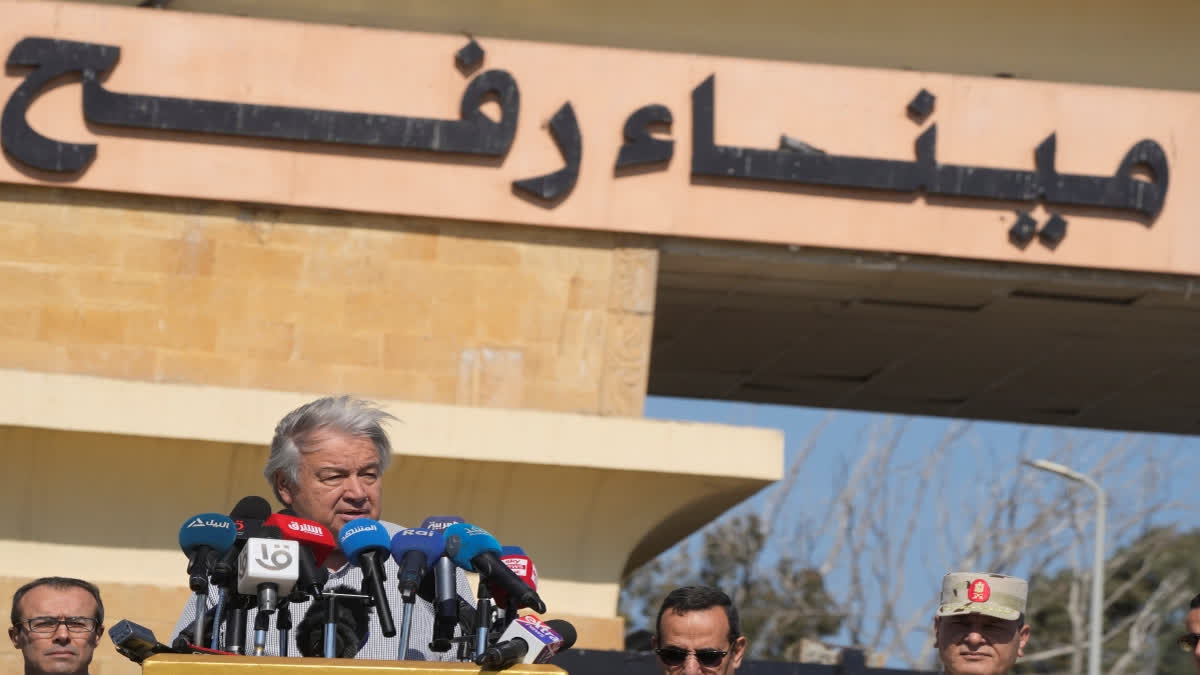Rafah Crossing (Egypt): UN Secretary-General Antonio Guterres stood near a long line of waiting trucks Saturday and declared it was time to truly flood Gaza with life-saving aid," calling the starvation inside the enclave a moral outrage. He called for an immediate cease-fire between Israel and Hamas.
Guterres spoke on the Egyptian side of the border not far from the southern Gaza city of Rafah, where Israel plans to launch a ground assault despite widespread warnings of a potential disaster. More than half of Gaza's population has taken refuge there. Any further onslaught will make things even worse worse for Palestinian civilians, worse for hostages and worse for all people in the region," Guterres said.
He spoke a day after the UN Security Council failed to reach consensus on the wording of a resolution supporting an immediate and sustained cease-fire. Guterres repeatedly noted the difficulties of getting aid into Gaza, for which international aid agencies have largely blamed Israel.
Here from this crossing, we see the heartbreak and heartlessness a long line of blocked relief trucks on one side of the gates, the long shadow of starvation on the other, he said. He added: It is time for an ironclad commitment by Israel for total access for humanitarian goods to Gaza, and in the Ramadan spirit of compassion, it is also time for the immediate release of all hostages.
Hamas is believed to be holding around 100 hostages as well as the remains of 30 others taken in its Oct 7 attack that killed about 1,200 people, mostly civilians, and sparked the war. An estimated 1.5 million Palestinians now shelter in Rafah. US Secretary of State Antony Blinken on Thursday said an Israeli ground assault on Rafah would be a mistake and unnecessary in defeating Hamas. That marked a shift in the position for the United States, whose officials have concluded there is no credible way for getting sheltering civilians out of harm's way.
Israeli Prime Minister Benjamin Netanyahu has vowed to press forward with military-approved plans for the offensive, which he has said is crucial to achieving the stated aim of destroying Hamas. The military has said Rafah is Hamas' last major stronghold and ground forces must target four battalions remaining there.
Israel's invasion has killed more than 32,000 people, according to Gaza health officials, while leaving much of the enclave in ruins and displacing some 80% of the enclave's 2.3 million people. Gaza's Health Ministry doesn't differentiate between civilians and combatants, but has said women and children make up the majority of the dead. Israel blames Hamas for civilian deaths and accuses it of operating within residential areas. Fighting raged Saturday around Gaza's largest hospital.
Israel's military said it had killed more than 170 militants in Shifa hospital since the start of their raid five days ago. Nearby Gaza City residents told The Associated Press that Israeli troops had blown up several residential buildings. They are emptying the whole area," said Abdel-Hay Saad, who lives on the western edge of Gaza City's Rimal neighbourhood.
Gaza's Health Ministry on Friday said the raid on the hospital complex had torched its departments treating patients with vascular disease. It said Israel's military had detained health workers, patients and relatives inside the complex.



